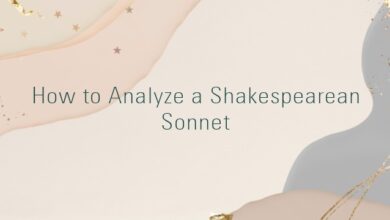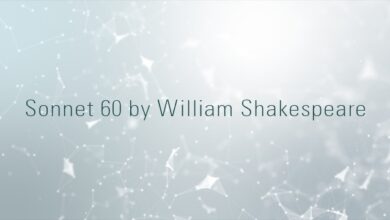
If there be nothing new, but that which is
Hath been before, how are our brains beguil’d,
Which labouring for invention bear amiss
The second burthen of a former child.
Oh that record could with a backward look,
Even of five hundred courses of the sun,
Show me your image in some antique book,
Since mind at first in character was done,
That I might see what the old world could say
To this composed wonder of your frame;
Whether we are mended, or where better they,
Or whether revolution be the same.
Oh sure I am the wits of former days,
To subjects worse have given admiring praise.
�The poet toys with the old idea that ‘there is nothing new under the sun’ and speculates on what it might mean for his beloved and for the reports of his beauty.He does not take the idea too seriously, and he imagines that the historical record would not have done justice to his fair love’s beauty. He thinks it unlikely that anyone with a comparable ‘composed wonder of frame’ has existed in the past. The praise that was heaped on beauteous persons was probably exaggerated, and the admiration they engendered was excessive, for they were worse in stature and beauty than the beloved youth.
The 1609 Quarto Version
IF their bee nothing new,but that which is,
Hath beene before , how are our braines beguild,
Which laboring for inuention beare amiſſe
The ſecond burthen of a former child ?
Oh that record could with a back-ward looke,
Euen of fiue hundreth courſes of the Sunne,
Show me your image in ſome antique booke,
Since minde at firſt in carrecter was done.
That I might ſee what the old world could ſay,
To this compoſed wonder of your frame,
Whether we are mended,or where better they,
Or whether reuolution be the ſame.
Oh ſure I am the wits of former daies,
To ſubiects worſe haue giuen admiring praiſe.
Commentary
1. If there be nothing new, but that which is‘There is nothing new under the sun’ is proverbial and may be traced back to the Bible. (See extract below of a letter from Sir Thomas Bodley to Sir Francis Bacon ‘upon his new Philosophy’, written in 1607). The syntax encourages one to read at first ‘If all that is new is that which now is..’ but the mind modifies this meaning on reaching the second line.2. Hath been before, how are our brains beguil’d,beguiled = deceived, tricked. See note on line 4 below
3. Which labouring for invention bear amisslabouring – the metaphor is from childbirth. The poet labours to give birth to his new ideas (invention). But he is mistaken and suffers a miscarriage (he bears amiss).4. The second burthen of a former child.
burthen = burden. An obsolete spelling.
second – because it is a repeat performance. Someone else has already produced a similar ‘invention’ in a former age, hence a former child‘.
The result of the birth pangs is an infant which has already been born to another (in former times). It is worth mentioning that the necessity of producing heirs in noble and royal families could result in deceitful practices. A suppositious babe, with the connivance of a mifwife, could be introduced and passed off as the true birth of a wife who failed to conceive for whatever reason. The babe would have been recently born to some other woman in the locality and slipped in secretly for the purpose of substitution if the birth went wrong, or if nothing was produced. At royal births various men of high rank would be present to ensure that this did not occur, and that the birth was genuine. Mary Tudor (Bloody Mary) endured what appears to have been a phantom pregnancy in her desperation to produce an heir. (See OED supposititious 1.b. and supposition 4.a ). The possibility of a reference to this practice is supported by the use of beguiled in line 2 above.5. Oh that record could with a backward look,record = the historical record, writing.
with a backward look – i.e. delving far back into the historical record.6. Even of five hundred courses of the sun,Even of – of at least (as a bare minimum).
five hundred courses of the sun – probably six hundred years. The old English hundred was apparently 120, so five of these add up to 600. According to some this was the figure of the Platonic cycle, after which all earthly events supposedly repeated themselves. It is doubtful if Shakespeare gave any credence to it, knowing his fondness for the old chronicles which described events much more remote than 600 years and yet avoided repetitions (e.g. King Lear, Cymbeline).
A course of the sun was one year, during which time the earth completes its orbit.
A sibyl, that had number’d in the world
The sun to course two hundred compasses,
In her prophetic fury sew’d the work; Oth.III.4.70-27. Show me your image in some antique book,image – a descriptive image. One tends to think of a painted portrait also, but the following lines seem to rule that out.8. Since mind at first in character was done,mind = thoughts, ideas.
in character = in letters, in the written word.
Since mind etc. = since first history began to be written down as recorded thoughts.9. That I might see what the old world could saythe old world = antiquity; ancient Greece and Rome; times past. Probably not a reference to The Old World, signifing the Eastern hemisphere, as distinct from the New World of America.10. To this composed wonder of your frame;composed wonder of your frame – handsomely moulded and wondrous creation. to frame was to produce or make. A frame was a structure, but it was also used as a synonym for a body, animal or human (OED.9.a.). See:
Since I suppose we are to be made no stronger
Than faults may shake our frames MM.II.4.131-2.
…………..We smothered
The most replenished sweet work of nature,
That from the prime creation e’er she framed. R3.IV.3.17-1911. Whether we are mended, or where better they,mended = improved, made superior.
where better they = in what ways they were superior to us. Some editors emend to whe’er for whether, giving a ‘whether… or whether ‘ construction, proabably not necessary as in reading the alternative meaning could no doubt be heard even without the emendation.12. Or whether revolution be the same.Or whether the cyclical revolution of time has brought us round to the same pre-existing circumstances; or whether fortune’s wheel has produced the same results as in former times. The word revolution is not used by Shakespeare in the sense of ‘the overthrow of established government’. It is found only in four places in the corpus, and the following gives an adequate idea of its meaning.
O God! that one might read the book of fate,
And see the revolution of the times
Make mountains level, and the continent,
Weary of solid firmness, melt itself
Into the sea! 2H4.III.1.45-9.13. Oh sure I am the wits of former days,
The couplet expresses scepticism that anyone of former days could have been as beautiful as the youth. If any wonderful descriptions are to be found, they are based on inferior subjects.
wits = inventive brains. OED.2.b. The sense of wit = humour was not in use until much later.14. To subjects worse have given admiring praise.
subjects worse = worse subjects, worse themes, persons, etc.
The couplet rhyme days, praise is also used in 38, 62 and 106. The word praise is understandably not uncommon in the sonnets, occurring 35 times (including related forms).
Additional notes
I remember here a note which Paterculus made of the incomparable wits of the Grecians and Romans in their flourishing state, that there might be this reason of their notable downfall in their issue that came after; be- cause by nature Quod summo studio petitum est, ascendit in summum, difficilisque imferfecto mora est ; insomuch that men perceiving that they could go no farther, be- ing come to the top, they turned back again of their own accord, forsaking those studies that are most in request, and betaking themselves to new endevours, as if the thing that they sought had been by prevention surprised by others.
So it fared in particular with the eloquence of that age, that when their successors found that hardly they could equal, by no means excel their predecessors, they began to neglect the study thereof, and both to write and speak for many hundred years in a rustical manner, till this latter revolution brought the wheel about again, by inflaming gallant spirits to give the onset a-fresh, with straining and striving to climb unto the top and height of perfection, not in that gift only, but in every other skill in any part of learning.
For I do not hold it an erroneous conceit to think of every science, that as now they are professed, so they have been before in all precedent ages, though not alike in all places, nor at all times alike in one and the same; but according to the changings and turn ings of times, with a more exact and plain, or with a more rude and obscure kind of teaching.
And if the question should be asked, what proof I have of it, I have the doctrine of Aristotle, and of the deepest learned clerks, of whom we have any means to take any notice, That as there is of other things, so there is of sciences ortus et interitus, which is also the mean- ing, (if I should expound it), of nihil novum sub sole, and is as well to be applied ad facta, as ad dicta, ut nihil ne- que dictum neque factum, quod non est dictum et factum prius. I have farther for my warrant that famous com- plaint of Solomon to his son against the infinite making of books in his time, of which in all congruity great part were of observations and instructions in all kind of literature ; and of those there is not now so much as one Pamphlet, (only some parts of the bible excepted) remaining to posterity.
Part of a letter from Thomas Bodley to Francis Bacon of 1607 discussing the latter’s philosophical work Cogitata et Visa. Bodley supports the idea of continuous revolutions of the human condition, because everything strains for perfection, but such a state cannot be maintained, with the result that deterioration sets in, followed by perfection once again, and so on.
The Latin translates as follows:
Quod summo studio etc. – For that which is sought with the highest zeal reaches the heights, but it is difficult for imperfect nature to remain thus thereafter.
nihil novum sub sole = there is nothing new under the sun.
ad facta …. ad dicta = to deeds ….. to sayings.
ut nihil neque etc. = for there is nothing which is said or done which has not been said or done previously.







